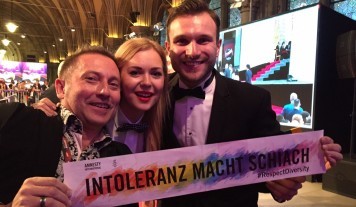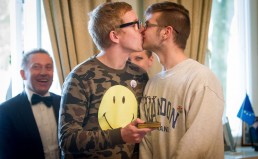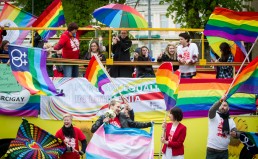On the 17th of May, 2015, celebrated throughout the world as the International Day against Homophobia and Transphobia (IDAHOT), the official opening ceremony for Eurovision took place at Vienna’s City Hall Square. Vladimir Simonko, Executive Director of the national LGBT* rights organization LGL, was among the few lucky fans invited to the red carpet event, and had the chance to get an up close look at the Eurovision contestants, who came from over 40 countries.
Vladimir Simonko invited the stars to support Amnesty International’s campaign for tolerance (#RespectDiversity) by taking photos with the campaign slogan. Representatives from Lithuania, Latvia, Australia and Austria enthusiastically took the opportunity to promote this message of tolerance.
During his visit to Vienna, Executive Director of LGL Vladimir Simonko was actively involved in supporting Amnesty International’s social campaign, #RespectDiversity, which aims to promote tolerance, respect, and diversity in society. The social campaign will seek to draw attention to the following problematic aspects in the context of the Eurovision Song Contest 2015:
- EU: Comprehensive Protection from Discrimination for LGBTI Individuals
In the EU, not everyone enjoys the same level of protection from discrimination. For instance, people discriminated against because of their sexual orientation in the fields of social protection, education, access to goods and services, enjoy a lower level of legal protection than people discriminated because of their ethnicity or gender. Amnesty International urges the EU to finally bring the negotiations on a horizontal Anti-Discrimination Directive begun in 2008 to a successful conclusion in 2015.
- Europe: no Compulsory Surgery, Divorce and Psychiatric Diagnosis for Transgender
Most European countries, including Austria, require psychiatric diagnosis as a precondition for legal gender recognition on the basis of the international disease index (ICD-10), which stigmatizes the gender identity of transgender people as a psychological disorder. A number of countries, such as Belgium, Finland, France and Norway require transgender people to divorce or undergo irreversible surgical treatments, including sterilization. In some countries such as Ireland and Lithuania, legal gender recognition is still not possible. Amnesty International calls for an end to the pathologization of the gender identity of transgender people and for a quick, accessible and transparent procedure for legal gender recognition based on the self-declaration of those affected.
- Austria: Levelling-up – no Discrimination within the Protection from Discrimination
In Austria, there are protection gaps similar to those at EU level in terms of access to goods and services. As a consequence, individuals discriminated against because of their sexual orientation when renting an apartment, booking a hotel room or visiting a restaurant are afforded no legal protection. Amnesty International urges Austria to finally adopt the long-debated “Levelling-up”, i.e. the harmonization of anti-discrimination provisions and the alignment of the level of legal protection provided for all discrimination grounds, including sexual orientation.
- Austria: Access to all Legal Partnership Models for all
In Austria, there are currently two legal partnership models: Marriage, which can only be concluded by heterosexual partners, and registered partnership, which is exclusively reserved for same-sex partners and still differs in more than 30 points from the statuary provisions on marriage. So far, public debate has focused mainly on abolishing openly discriminatory differences between registered partnership and marriage. Amnesty International calls on Austria to ensure access to all existing and future legal partnership models for all, regardless of their sexual orientation and gender identity, including access to marriage for same-sex couple and access to registered partnership for heterosexual couples.
- Austria: Free Choice of Name and Legal Gender Recognition for Transgender
In Austria, there is no legal requirement to undergo surgery. Still, unless they have their gender identity legally recognized, transgender people may only choose gender-neutral names. In turn, legal gender recognition requires stigmatizing, psychiatric diagnoses, based on the international disease index (ICD-10). Amnesty International calls for all to be able to change their first names regardless of their gender and that legal gender recognition must not be linked to disease, but solely be based on self-declaration.
© Photo courtesy of Vladimir Simonko





























